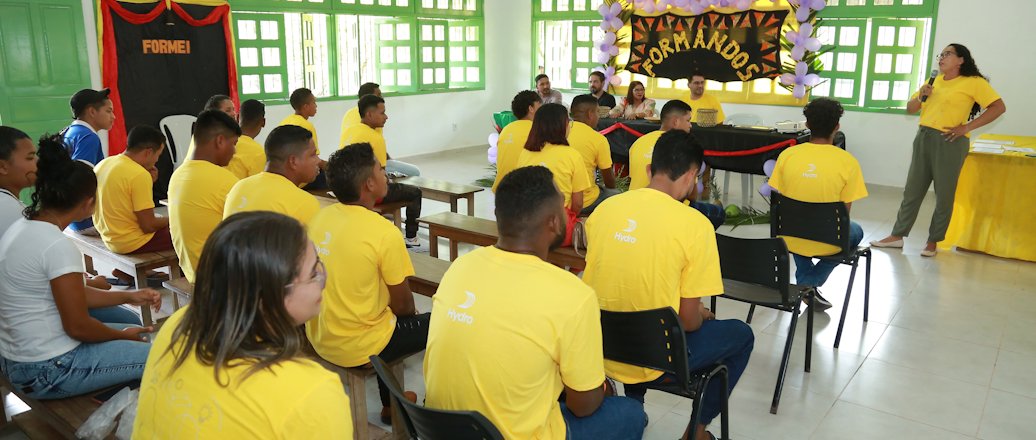Wesley Trindade e Trindade has lived in the Quilombola community of Juquiri, in the Pará municipality of Moju, since he was born, 22 years ago. He is a student of the Industrial Chemistry course at the Federal University of Pará (UFPA), but had to leave because of the distance and lack of resources to attend classes in Belém. Even to take a course at Senai, Wesley would need to travel by boat to Moju's headquarters; take a bus to Abaetetuba and then another means of transport to Barcarena, where the closest Senai unit is located.
Fortunately, the opportunity came to Wesley and this week he received his certificate of completion of the Munk Operator technical course, held in the community itself. “To get such training, I would have to travel a long way and pay the costs. I managed to do it for free, here in our space. It was a very new experience for me and I am sure it will bring many benefits to my professional career”, he comments.
Wesley is one of the 100 quilombola students who received certificates of completion in the municipality of Moju as part of the Professional Training Program, an initiative by Hydro in partnership with Senai, the result of dialogue with communities neighboring the company's operational activities. The objective is to offer professional technical courses for residents of these communities, aiming to leave a legacy of knowledge and support financial self-sufficiency, making a relevant contribution to sustainable development. This program is in line with Hydro's strategy to promote the development of skills and capabilities with shared value for the future of communities.
For Gil Tavares, Senai Barcarena's Pedagogical Technical Coordinator, serving quilombola communities with technical courses in their territory was challenging. “We tackled dirt roads, set up a computer lab in a warehouse on the banks of the Moju river, among other challenges. But the most important thing is the students' satisfaction with completing a qualification course and being prepared for the job market. It is worth mentioning that many of the students were hired by companies that operate in the region, this is the main legacy left by the Hydro and Senai partnership for the quilombola communities”, he says.
Graduates received certificates in technical courses for motorcycle maintenance mechanic; excavator operator; porter and watchman; administrative; munk operator and digital technologies. In addition to the practical content, the courses also offered theoretical knowledge, necessary for the exercise of professional activity: “I learned about tools such as the 5S and the Regulatory Standards (NRs), things that caught my attention and will be very useful”, comments Wesley.
“Living with different people, learning from super accessible teachers, a lot of learning. This course was a huge boost, I feel like I finish it like a new person. It was very rewarding, there were only three women in the class and we all learned together. I'm very happy”, says Jaqueline Malcher, from Jambuaçu, who obtained her certificate as an excavator operator.
: December 1, 2022







